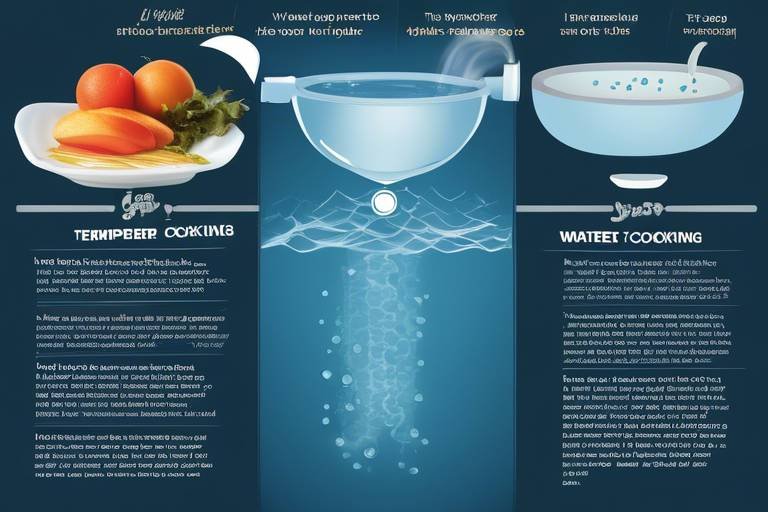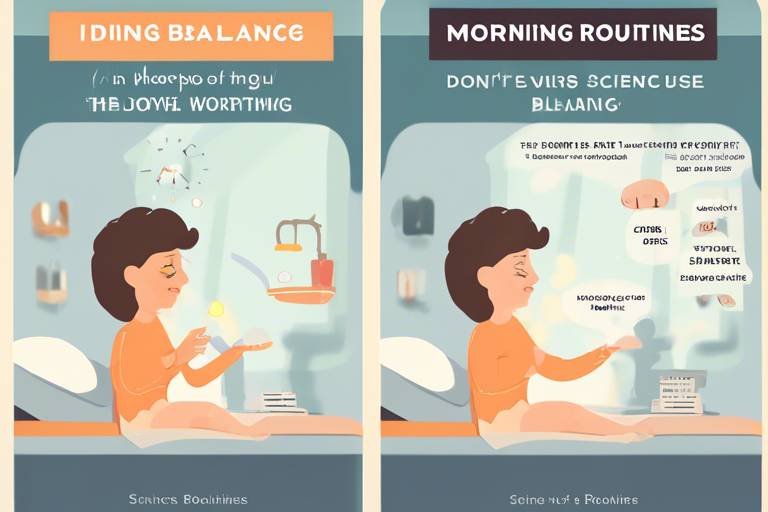The Role of Vitamins in Our Daily Diet - A Scientific Perspective
Have you ever wondered why your grandma always insisted on eating your veggies? Well, it turns out she was onto something big! Vitamins are the unsung heroes of our daily nutrition, playing crucial roles in keeping our bodies functioning smoothly. Imagine vitamins as tiny soldiers, working tirelessly behind the scenes to support everything from your immune system to your skin's glow. This article dives deep into the world of vitamins, exploring their functions, sources, and the dire consequences of deficiencies, all backed by the marvels of scientific research.
Vitamins are essential organic compounds that our bodies require in small amounts for various physiological functions. They are not just fancy words you hear in health commercials; they are vital for maintaining our health. Vitamins can be classified into two main categories: fat-soluble and water-soluble. Understanding these classifications can help you make informed choices about your diet and ensure you’re getting the nutrients your body craves.
Let’s break it down! There are two primary categories of vitamins: fat-soluble and water-soluble. Each type has unique properties that make them essential for different bodily functions. Fat-soluble vitamins, like A, D, E, and K, are stored in your body’s fatty tissues, which means they can hang around for a while. On the flip side, water-soluble vitamins, such as the B vitamins and vitamin C, aren’t stored in the body and need to be replenished regularly. So, let’s take a closer look at each type!
Fat-soluble vitamins are like the VIPs of the vitamin world. They include vitamins A, D, E, and K, and they love to hang out in your body’s fat tissues. This means that when you consume these vitamins, your body can store them for later use. Let's explore each of these vitamins and their significance:
Vitamin A is crucial for vision, immune function, and skin health. Think of it as your body's shield against infections and a booster for your eyesight. You can find vitamin A in foods like carrots, sweet potatoes, and spinach. The recommended intake varies, but generally, adults need about 900 micrograms per day. A deficiency can lead to serious issues, including night blindness and a weakened immune system.
Vitamin D is like sunshine in a bottle! It plays a vital role in calcium absorption and bone health. Our bodies can produce vitamin D when exposed to sunlight, but it can also be found in foods like fatty fish, fortified dairy products, and egg yolks. If you’re not getting enough sunlight, supplementation may be necessary. Inadequate levels of vitamin D can lead to bone disorders like rickets in children and osteoporosis in adults.
Water-soluble vitamins, on the other hand, are like the friendly neighbors who drop by but don’t stick around. These include the B vitamins and vitamin C. They are not stored in the body, which means you need to consume them regularly. Let's take a look at their roles:
Vitamin deficiencies can lead to a variety of health issues. For instance, a lack of vitamin C can result in scurvy, characterized by fatigue and gum disease. Similarly, insufficient B vitamins can lead to anemia and neurological issues. The symptoms of deficiencies can be subtle at first, but they can escalate into serious health problems if not addressed. Here are some common deficiencies:
- Vitamin A: Night blindness, dry skin.
- Vitamin D: Bone pain, muscle weakness.
- Vitamin C: Fatigue, easy bruising.
- B Vitamins: Fatigue, mood changes.
Research suggests that adequate vitamin intake may help prevent certain diseases. For example, antioxidants like vitamins C and E can combat oxidative stress, potentially lowering the risk of chronic diseases such as heart disease and cancer. It's fascinating how these little nutrients can have such a big impact on our health!
The debate between vitamin supplementation and obtaining nutrients from whole foods is ongoing. While supplements can be beneficial in certain situations, they often lack the synergistic effects of whole foods. Whole foods provide not just vitamins but also minerals, fiber, and other beneficial compounds. So, while popping a vitamin pill might seem convenient, nothing beats the nutritional punch of a well-rounded diet rich in fruits, vegetables, and whole grains.
In conclusion, a balanced diet rich in vitamins is crucial for overall health. Vitamins are not just another trend; they are essential for our bodies to function optimally. Prioritizing nutrient-rich foods in your daily meals can lead to a healthier, happier life. So next time you're at the grocery store, think of those vitamins as your allies in the quest for good health!
- What are the best sources of vitamins? Fruits, vegetables, whole grains, nuts, seeds, and lean proteins are excellent sources of vitamins.
- Can I get enough vitamins from my diet alone? Yes, a well-balanced diet typically provides all the vitamins your body needs.
- Are vitamin supplements necessary? Supplements may be necessary for individuals with specific deficiencies or dietary restrictions, but whole foods are generally preferred.
- How can I tell if I'm deficient in vitamins? Symptoms vary by vitamin, but common signs include fatigue, skin issues, and mood changes. Consult a healthcare professional for testing.

Understanding Vitamins
Vitamins are essential organic compounds that play a pivotal role in our bodies, acting as the fuel that powers various physiological functions. Imagine your body as a complex machine; vitamins are like the tiny gears that keep everything running smoothly. Without them, our system can start to falter, leading to a range of health issues. But what exactly are these vital nutrients? They are classified into two main categories: fat-soluble and water-soluble vitamins, each with its unique properties and functions.
Fat-soluble vitamins, which include vitamins A, D, E, and K, are stored in the body’s fatty tissues and liver. This means that they can be utilized when needed, but it also means that excessive intake can lead to toxicity. On the other hand, water-soluble vitamins, such as the B vitamins and vitamin C, are not stored in the body. Instead, they dissolve in water and are excreted through urine, making regular consumption crucial. Think of them as the fleeting moments of joy in life—here today, gone tomorrow, and you need to savor them while they last!
The significance of vitamins in human health cannot be overstated. They are involved in numerous bodily functions, including
- Metabolism regulation
- Immune system support
- Cell and tissue growth
- Energy production
In summary, understanding vitamins is about recognizing their indispensable role in maintaining our health. They are not just supplements or additions to our diet; they are the very foundation of our well-being. As we delve deeper into the different types of vitamins, their sources, and their functions, it becomes clear that a well-rounded diet is essential for harnessing the full potential of these nutrients.

Types of Vitamins
Vitamins are **essential nutrients** that our bodies cannot produce on their own, and they are classified into two main categories: fat-soluble and water-soluble. Understanding these categories is crucial because they influence how we absorb, store, and utilize these vital compounds. Each type of vitamin has unique properties and functions that play a significant role in maintaining our health. Think of vitamins as the tiny gears in a well-oiled machine; without them, the machine struggles to operate smoothly.
Fat-soluble vitamins are stored in the body's fatty tissues and liver, which means they can accumulate over time. This group includes vitamins A, D, E, and K. Each of these vitamins has distinct roles in our bodies. For instance, vitamin A is essential for our vision and immune function, whereas vitamin D is crucial for calcium absorption and bone health. Because these vitamins can be stored, it's essential to consume them in moderation; excessive intake can lead to toxicity.
On the other hand, we have water-soluble vitamins, which include the B vitamins and vitamin C. Unlike their fat-soluble counterparts, these vitamins are not stored in the body and must be replenished regularly through our diet. They dissolve in water and are excreted through urine, which means that a consistent intake is necessary to avoid deficiencies. Water-soluble vitamins are vital for energy production, immune function, and even skin health. Imagine them as the fuel that keeps our engine running; without a steady supply, we risk running out of power.
| Type of Vitamin | Examples | Solubility | Storage in the Body |
|---|---|---|---|
| Fat-Soluble | A, D, E, K | Fat-soluble | Stored in fatty tissues and liver |
| Water-Soluble | B vitamins, C | Water-soluble | Not stored; must be consumed regularly |
In summary, the distinction between fat-soluble and water-soluble vitamins is not just academic; it has real implications for how we approach our nutrition. Understanding these differences can help us make informed choices about our diets and ensure we are getting the right nutrients in the right amounts. So, next time you plan your meals, think about the types of vitamins you're including. Are you getting a good mix of both fat-soluble and water-soluble vitamins? Your body will thank you!
- What are the main functions of vitamins? Vitamins play various roles, including supporting immune function, aiding in energy production, and maintaining healthy skin and bones.
- How can I ensure I'm getting enough vitamins? A balanced diet rich in fruits, vegetables, whole grains, and lean proteins can help you meet your vitamin needs.
- Are vitamin supplements necessary? While supplements can be beneficial for some individuals, obtaining vitamins from whole foods is generally recommended for optimal health.

Fat-Soluble Vitamins
Fat-soluble vitamins are a unique group of vitamins that play crucial roles in maintaining our health. Unlike their water-soluble counterparts, these vitamins are stored in the body's fatty tissues and liver, which means they can be retained for longer periods. This storage capability allows for a more sustained release of these essential nutrients into the bloodstream, but it also means that excessive intake can lead to toxicity. The primary fat-soluble vitamins include Vitamin A, Vitamin D, Vitamin E, and Vitamin K. Each of these vitamins has distinct functions that are vital for various bodily processes.
For instance, Vitamin A is essential for maintaining healthy vision and a robust immune system. It contributes to the formation of rhodopsin, a pigment in the retina that helps us see in low light. Moreover, Vitamin A plays a significant role in skin health and cellular communication. You can find this vitamin in foods such as carrots, sweet potatoes, and leafy greens. On the other hand, Vitamin D is often referred to as the "sunshine vitamin" because our bodies produce it when exposed to sunlight. This vitamin is critical for calcium absorption, which in turn supports bone health. Natural sources of Vitamin D include fatty fish, egg yolks, and fortified dairy products.
Vitamin E acts as a powerful antioxidant, protecting our cells from oxidative stress and damage. It is commonly found in nuts, seeds, and vegetable oils, making it easy to incorporate into a balanced diet. Lastly, Vitamin K is essential for blood clotting and maintaining strong bones. It can be found in green leafy vegetables like spinach and kale, as well as in fermented foods. The synergy of these fat-soluble vitamins is remarkable, and they often work together to support various physiological functions.
While these vitamins are essential, it’s important to consume them in moderation. Over-supplementation, particularly of Vitamins A and D, can lead to serious health issues, including liver damage and hypercalcemia, respectively. Therefore, it is always advisable to aim for a balanced diet that includes a variety of foods rich in these vitamins. Below is a summary of the key fat-soluble vitamins, their functions, and food sources:
| Vitamin | Function | Food Sources |
|---|---|---|
| Vitamin A | Vision, immune function, skin health | Carrots, sweet potatoes, spinach |
| Vitamin D | Calcium absorption, bone health | Fatty fish, egg yolks, fortified milk |
| Vitamin E | Antioxidant, skin health | Nuts, seeds, vegetable oils |
| Vitamin K | Blood clotting, bone health | Green leafy vegetables, fermented foods |
In conclusion, understanding the role of fat-soluble vitamins in our diet is crucial for maintaining optimal health. By incorporating a variety of nutrient-rich foods into our meals, we can ensure that we are meeting our body's needs without the risks associated with over-supplementation. Always remember, a balanced diet is the best approach to achieving and sustaining good health!
- What are fat-soluble vitamins? - These are vitamins that dissolve in fats and oils and are stored in the body's fatty tissues.
- How can I ensure I get enough fat-soluble vitamins? - By including a variety of foods such as leafy greens, fish, nuts, and dairy products in your diet.
- Can I take fat-soluble vitamins as supplements? - Yes, but be cautious of the dosage as excessive intake can lead to toxicity.
- What are the symptoms of fat-soluble vitamin deficiencies? - Symptoms vary by vitamin but can include vision problems (Vitamin A), bone pain (Vitamin D), and easy bruising (Vitamin K).

Vitamin A
is not just another nutrient; it's a powerhouse that plays a crucial role in several bodily functions. Think of it as the superhero of your diet, swooping in to protect your vision, bolster your immune system, and keep your skin glowing. This vitamin is essential for the maintenance of healthy vision, particularly in low-light conditions, and it also contributes significantly to the health of your skin and mucous membranes.
So, where can you find this amazing vitamin? Well, it comes in two primary forms: preformed vitamin A (found in animal products) and provitamin A carotenoids (found in plant foods). Here’s a quick breakdown of some of the best sources:
| Source | Type | Vitamin A Content (per 100g) |
|---|---|---|
| Carrots | Provitamin A (Beta-Carotene) | 8285 µg |
| Sweet Potatoes | Provitamin A (Beta-Carotene) | 961 µg |
| Spinach | Provitamin A (Beta-Carotene) | 469 µg |
| Liver (Beef) | Preformed Vitamin A | 9000 µg |
| Eggs | Preformed Vitamin A | 140 µg |
Recommended daily intake varies by age and gender, but generally, adult men need about 900 micrograms and women need around 700 micrograms of vitamin A. But beware! Too much vitamin A, especially from supplements, can lead to toxicity, causing symptoms like dizziness, nausea, and even headaches. So, moderation is key!
What happens when you don't get enough vitamin A? The consequences can be quite serious. A deficiency can lead to night blindness, a condition where your eyes struggle to adjust to low light. In severe cases, it can even cause complete vision loss. Additionally, a lack of vitamin A can compromise your immune system, making you more susceptible to infections.
In summary, vitamin A is a vital nutrient that shouldn’t be overlooked. It supports essential functions in our bodies and contributes to overall health. By including a variety of vitamin A-rich foods in your diet, you can ensure that you’re reaping all the benefits this powerful vitamin has to offer.
- What are the symptoms of vitamin A deficiency? Night blindness, dry skin, and a weakened immune system are common symptoms.
- Can I get enough vitamin A from plant sources? Yes, plant sources provide provitamin A carotenoids, which your body can convert into active vitamin A.
- Is it safe to take vitamin A supplements? While supplements can be beneficial, it's important to consult a healthcare provider to avoid toxicity.
- How can I include more vitamin A in my diet? Incorporate foods like carrots, sweet potatoes, spinach, and liver into your meals.

Vitamin D
Vitamin D is often referred to as the "sunshine vitamin" because our bodies produce it in response to sunlight exposure. This vital nutrient plays a crucial role in maintaining bone health by facilitating calcium absorption in the gut. Without adequate vitamin D, bones can become thin, brittle, or misshapen. In fact, a deficiency in this vitamin can lead to serious health issues such as osteoporosis in adults and rickets in children.
Natural sources of vitamin D include fatty fish like salmon, mackerel, and sardines, as well as fortified foods such as milk, orange juice, and cereals. However, it can be challenging to obtain sufficient vitamin D from diet alone. This is particularly true for individuals who live in areas with limited sunlight or those who spend most of their time indoors. For these reasons, many people may need to consider supplementation to meet their daily requirements.
The recommended dietary allowance (RDA) for vitamin D varies depending on age, sex, and life stage. For most adults, the RDA is 600 to 800 IU (International Units) per day. However, some experts suggest that higher doses may be necessary for optimal health, especially for those with low blood levels of this vitamin. It's important to consult with a healthcare provider before starting any supplementation, as excessive intake can lead to toxicity and adverse health effects.
Inadequate levels of vitamin D can manifest in various ways. Common symptoms of deficiency include:
- Fatigue
- Bone pain
- Muscle weakness
- Increased susceptibility to infections
Long-term deficiency can lead to more severe health implications, including cardiovascular disease, certain cancers, and autoimmune disorders. Therefore, ensuring adequate vitamin D levels is essential for maintaining overall health and well-being.
In conclusion, vitamin D is a powerhouse nutrient that significantly impacts our health. Regular exposure to sunlight, a balanced diet rich in vitamin D sources, and appropriate supplementation can help maintain optimal levels and prevent deficiencies. Remember, a little sunshine can go a long way in keeping our bones strong and our immune systems robust!

Water-Soluble Vitamins
Water-soluble vitamins are a fascinating group of nutrients that play a crucial role in keeping our bodies functioning smoothly. Unlike their fat-soluble counterparts, these vitamins, which include the B vitamins and vitamin C, are not stored in the body. This means that we need to replenish them regularly through our diet. Imagine trying to fill a bucket with water that has a hole in it; without constant refilling, it will eventually run dry. That's how our bodies handle water-soluble vitamins!
Each of these vitamins has unique functions that contribute to our overall health. For instance, vitamin C is well-known for its role in boosting the immune system and promoting healthy skin. It's like a superhero for your body, fighting off colds and helping wounds heal. On the other hand, the B vitamins, which include B1 (thiamine), B2 (riboflavin), B3 (niacin), B5 (pantothenic acid), B6 (pyridoxine), B7 (biotin), B9 (folate), and B12 (cobalamin), are vital for energy production and red blood cell formation. They help convert the food we eat into fuel, which is essential for our daily activities.
To ensure you're getting enough water-soluble vitamins, it's important to include a variety of foods in your diet. Here are some excellent sources:
- Vitamin C: Citrus fruits (like oranges and lemons), strawberries, bell peppers, and broccoli.
- B Vitamins: Whole grains, meat (especially liver), eggs, dairy products, legumes, seeds, and leafy green vegetables.
One of the challenges with water-soluble vitamins is that they can be easily lost during cooking and food processing. For example, boiling vegetables can cause them to lose a significant amount of their vitamin content. To preserve these vital nutrients, consider steaming or microwaving your veggies, or even eating them raw when possible. Think of it as keeping the treasures of nature intact!
Deficiencies in water-soluble vitamins can lead to a range of health issues. For instance, a lack of vitamin C can result in scurvy, characterized by fatigue, gum disease, and skin issues. Similarly, insufficient B vitamins can lead to conditions such as anemia and fatigue. It's crucial to be aware of these vitamins and ensure we're consuming enough of them through a balanced diet.
In summary, water-soluble vitamins are essential for our health and well-being. They contribute to energy production, immune function, and overall vitality. By incorporating a diverse array of fruits, vegetables, whole grains, and proteins into our meals, we can ensure that our bodies receive the necessary nutrients to thrive. So, next time you're planning your meals, remember to include these vibrant, nutrient-rich foods to keep your vitamin levels topped up!
1. What are water-soluble vitamins?
Water-soluble vitamins are nutrients that dissolve in water and are not stored in the body. They need to be consumed regularly through diet.
2. Why are water-soluble vitamins important?
They play critical roles in various bodily functions, including energy production, immune support, and red blood cell formation.
3. How can I ensure I get enough water-soluble vitamins?
Incorporate a variety of fruits, vegetables, whole grains, and proteins into your meals to ensure adequate intake.
4. What happens if I don't get enough water-soluble vitamins?
Deficiencies can lead to health issues such as fatigue, anemia, and weakened immune function.

Vitamin Deficiencies and Health Implications
When we think about our health, we often focus on macronutrients like proteins, fats, and carbohydrates. However, vitamins play a crucial role in maintaining our overall well-being. A deficiency in any of these essential compounds can lead to a cascade of health issues that can affect every aspect of our lives. Imagine your body as a finely tuned engine; without the right fuel (vitamins), it simply cannot perform efficiently. Let’s dive into some common vitamin deficiencies and their implications.
One of the most prevalent deficiencies is Vitamin D. This vitamin is vital for calcium absorption, which is essential for strong bones. A lack of Vitamin D can lead to conditions like osteoporosis in adults and rickets in children. Symptoms of Vitamin D deficiency can include fatigue, bone pain, and muscle weakness. In severe cases, it can even increase the risk of chronic diseases such as cardiovascular issues. It's like trying to build a house without a solid foundation; without Vitamin D, your bones are at risk of crumbling under pressure.
Another significant deficiency is that of Vitamin B12. This vitamin is essential for nerve function and the production of DNA and red blood cells. A deficiency can lead to symptoms such as fatigue, weakness, and even neurological issues like numbness and tingling in the hands and feet. In older adults, a lack of Vitamin B12 can exacerbate cognitive decline, making it crucial for maintaining both physical and mental health. Think of Vitamin B12 as the spark plug in a car engine; without it, the engine may sputter and stall.
Vitamin C is another important player in our health. Known for its role in boosting the immune system, a deficiency can lead to scurvy, a condition characterized by fatigue, swollen gums, and joint pain. While scurvy is rare today, it serves as a reminder of the importance of this vitamin in our diets. Regular intake of Vitamin C can help ward off infections and keep our skin healthy and vibrant. It’s like having an umbrella on a rainy day; it protects you from the storm of illnesses that can come your way.
The implications of vitamin deficiencies extend beyond just physical symptoms. They can also affect our mental health. For instance, low levels of Vitamin D have been linked to mood disorders, including depression. Similarly, deficiencies in B vitamins, particularly B6 and B12, can contribute to feelings of anxiety and irritability. This connection between vitamins and mental health highlights the importance of a well-rounded diet. It’s not just about avoiding physical ailments; it’s also about nurturing our emotional well-being.
To summarize, vitamin deficiencies can lead to a range of health implications that affect both our physical and mental health. Understanding these deficiencies is the first step towards prevention. By ensuring we consume a balanced diet rich in vitamins, we can avoid the pitfalls of deficiency and maintain a vibrant, healthy life. Remember, your body is a complex system where every part relies on the other; neglecting one area can lead to a domino effect of health issues.
- What are the symptoms of vitamin deficiencies? Symptoms can vary widely depending on the vitamin but may include fatigue, weakness, skin issues, and cognitive problems.
- How can I ensure I'm getting enough vitamins? A balanced diet rich in fruits, vegetables, whole grains, and lean proteins is key. Consider consulting a healthcare provider for personalized advice.
- Are vitamin supplements necessary? While whole foods are the best source of vitamins, supplements can be beneficial for those with specific deficiencies. Always consult a healthcare professional before starting any supplements.

Vitamins and Disease Prevention
The relationship between vitamins and disease prevention is a fascinating topic that has garnered significant attention from researchers and health enthusiasts alike. It's like unlocking a treasure chest of health benefits that your body craves! Vitamins play a crucial role in maintaining our overall health and can help stave off a variety of chronic diseases. But how exactly do they do this? Let’s dive into the science behind it.
Many studies have shown that adequate intake of certain vitamins can bolster the immune system, reduce inflammation, and even lower the risk of chronic diseases such as heart disease, diabetes, and some cancers. For instance, vitamin C is renowned for its immune-boosting properties. It acts as an antioxidant, protecting our cells from damage caused by free radicals. This is crucial because oxidative stress has been linked to numerous health issues, including cancer and cardiovascular diseases.
Moreover, vitamins like E and D have also been shown to play protective roles. Vitamin E, another powerful antioxidant, helps combat oxidative stress and may reduce the risk of heart disease. On the other hand, vitamin D is essential for bone health and has been linked to a lower risk of certain cancers. Think of it as a shield that helps your body fight off potential threats.
Let’s take a closer look at some key vitamins and their roles in disease prevention:
| Vitamin | Role in Disease Prevention |
|---|---|
| Vitamin A | Supports immune function and vision, potentially reducing the risk of infections. |
| Vitamin C | Acts as an antioxidant, boosting immunity and potentially lowering the risk of chronic diseases. |
| Vitamin D | Essential for bone health and may reduce the risk of certain cancers and autoimmune diseases. |
| Vitamin E | Protects against oxidative stress, which can lower the risk of heart disease. |
While the benefits of vitamins are clear, it’s essential to remember that they work best in synergy with other nutrients found in whole foods. A diet that is rich in fruits, vegetables, whole grains, and lean proteins can provide the necessary vitamins your body needs to function optimally. Think of your body as a finely tuned orchestra – every vitamin plays its part in creating a harmonious balance that promotes health and well-being.
However, it’s also important to note that excessive intake of vitamins, particularly in supplement form, can lead to adverse effects. This is why it’s crucial to aim for a balanced approach to nutrition. Instead of relying solely on supplements, focus on incorporating a variety of nutrient-dense foods into your daily meals. This not only ensures you receive the vitamins necessary for disease prevention but also promotes overall health and vitality.
In conclusion, while vitamins are a vital piece of the puzzle in disease prevention, they are most effective when consumed as part of a balanced diet. By prioritizing whole foods rich in essential vitamins, you can enhance your body’s defenses and pave the way for a healthier future.
- What are the best sources of vitamins? Fruits, vegetables, whole grains, nuts, and lean proteins are excellent sources of essential vitamins.
- Can I get enough vitamins from my diet alone? Yes, a well-balanced diet typically provides all the vitamins your body needs. However, some individuals may require supplements.
- What happens if I take too many vitamins? Excessive intake of certain vitamins can lead to toxicity and health issues, so it's important to stick to recommended dosages.

Supplementation vs. Whole Foods
When it comes to getting our daily dose of vitamins, the debate between supplementation and obtaining nutrients from whole foods is as lively as a group of friends arguing over which pizza topping reigns supreme! On one side, you have the convenience and precision of supplements, while on the other, there’s the rich, complex world of whole foods that offer a multitude of nutrients in their natural forms. So, which is better for you? Let’s dive into the nitty-gritty!
First off, let’s talk about supplements. They come in various forms, like pills, powders, and even gummies, making it easy to pop a few to meet your vitamin needs. They can be particularly beneficial for individuals with specific dietary restrictions or medical conditions that hinder nutrient absorption. For example, vegans might struggle to get enough Vitamin B12 from plant-based foods alone, making supplementation a practical choice.
However, while supplements can fill in the gaps, they often lack the synergy found in whole foods. Whole foods not only provide vitamins but also offer essential minerals, fiber, and antioxidants that work together to promote health. Think of it like a well-orchestrated symphony where each instrument plays a crucial role in creating beautiful music. A single vitamin pill might be like a solo artist; it can shine, but it doesn’t deliver the full experience of a complete meal.
Moreover, the bioavailability of vitamins in whole foods is often higher than in supplements. This means your body can absorb and utilize the nutrients more efficiently when they come from natural sources. For instance, the Vitamin C found in an orange is more readily absorbed by your body than the same amount in a synthetic pill. So, while supplements can be a quick fix, they might not be as effective in the long run.
Now, let’s not forget the potential downsides of over-relying on supplements. Some people might think that if a little is good, more must be better, leading to excessive intake of certain vitamins. This can be dangerous, as fat-soluble vitamins like A, D, E, and K can accumulate in the body and cause toxicity. In contrast, whole foods are much less likely to lead to such issues, as it's difficult to consume excessive amounts of vitamins through a balanced diet.
So, what’s the takeaway? While supplements can be beneficial in certain situations, they shouldn’t replace whole foods in your diet. A vibrant, colorful plate filled with fruits, vegetables, whole grains, and lean proteins is your best bet for getting all the vitamins your body craves. It’s like choosing between a quick snack and a gourmet meal; the latter will always leave you feeling satisfied and nourished.
In conclusion, the ideal approach is to prioritize whole foods while using supplements as a safety net when necessary. This way, you can enjoy the best of both worlds—convenience and comprehensive nutrition. After all, a balanced diet is the cornerstone of good health!
- Can I get all my vitamins from whole foods? Yes, a balanced diet rich in fruits, vegetables, whole grains, and proteins can provide most of the vitamins your body needs.
- Are supplements safe? Supplements can be safe if taken as directed, but it's essential to consult with a healthcare professional before starting any new regimen.
- How do I know if I need supplements? If you have specific dietary restrictions or health conditions, or if you suspect a deficiency, it's best to consult a healthcare provider for personalized advice.

Conclusion: The Importance of a Balanced Diet
In conclusion, maintaining a balanced diet rich in vitamins is not just a recommendation; it is essential for our overall health and well-being. Vitamins play a pivotal role in various bodily functions, from boosting our immune system to supporting our metabolic processes. Without adequate intake of these vital nutrients, we risk facing a plethora of health challenges that could impact our quality of life.
It’s important to recognize that vitamins are best absorbed when they come from whole foods rather than supplements. Whole foods, like fruits, vegetables, whole grains, and lean proteins, not only provide vitamins but also offer a complex array of nutrients that work synergistically to promote health. For instance, the fiber found in fruits and vegetables aids in digestion, while the antioxidants help combat oxidative stress.
Moreover, the relationship between vitamins and chronic diseases is becoming increasingly clear. Research indicates that a diet rich in essential vitamins can help prevent conditions such as heart disease, diabetes, and certain cancers. Therefore, making conscious choices about what we eat can have profound implications for our long-term health.
As you consider your dietary habits, aim to include a variety of colorful foods on your plate. Think of your plate as a canvas where each color represents different vitamins and minerals. The more vibrant your meals, the more likely you are to meet your nutritional needs. Remember, variety is the spice of life, and it applies to our diets too!
To summarize, embracing a balanced diet filled with nutrient-rich foods is crucial for maintaining optimal health. It’s not just about avoiding deficiencies; it’s about thriving and feeling your best every day. So, take a moment to reflect on your eating habits and make adjustments as needed. Your body will thank you for it!
- What are the best sources of vitamins?
Fruits, vegetables, whole grains, lean meats, and dairy products are excellent sources of essential vitamins. - How can I tell if I have a vitamin deficiency?
Symptoms may include fatigue, weakness, and specific health issues related to the vitamin in question. Consulting a healthcare provider is recommended for proper diagnosis. - Is it better to get vitamins from food or supplements?
Whole foods are generally preferred as they offer a range of nutrients that work together, while supplements can sometimes lead to imbalances. - Can I get enough vitamins from a vegetarian or vegan diet?
Yes, with careful planning, a vegetarian or vegan diet can provide all the necessary vitamins and nutrients.
Frequently Asked Questions
- What are vitamins and why are they important?
Vitamins are essential organic compounds that our bodies need in small amounts to function properly. They play crucial roles in various physiological processes, including metabolism, immunity, and cell function. Without adequate vitamins, our bodies can face serious health issues.
- What are the main types of vitamins?
Vitamins are categorized into two primary types: fat-soluble and water-soluble. Fat-soluble vitamins (A, D, E, and K) are stored in the body's fatty tissues, while water-soluble vitamins (like the B vitamins and vitamin C) are not stored and need to be consumed regularly. Each type has unique properties and functions vital for health.
- How can I ensure I'm getting enough vitamins?
The best way to ensure adequate vitamin intake is through a balanced diet rich in fruits, vegetables, whole grains, lean proteins, and healthy fats. Incorporating a variety of foods can help you meet your nutritional needs without the need for supplements.
- What are the signs of vitamin deficiencies?
Signs of vitamin deficiencies can vary widely depending on the vitamin in question. Common symptoms include fatigue, weakened immunity, skin problems, and digestive issues. If you suspect a deficiency, it's essential to consult a healthcare professional for proper diagnosis and treatment.
- Can vitamins help prevent diseases?
Research suggests that adequate vitamin intake may play a role in preventing certain diseases, including chronic conditions like heart disease and osteoporosis. However, it's important to remember that vitamins should complement a healthy lifestyle rather than replace it.
- Is it better to get vitamins from food or supplements?
While supplements can help fill nutritional gaps, obtaining vitamins from whole foods is generally preferred. Whole foods provide a complex mix of nutrients and other beneficial compounds that work together, offering better health benefits than isolated supplements.
- What should I do if I'm considering vitamin supplements?
If you're thinking about taking vitamin supplements, it's best to consult with a healthcare provider first. They can help assess your dietary needs and determine if supplementation is necessary based on your individual health status and lifestyle.



















